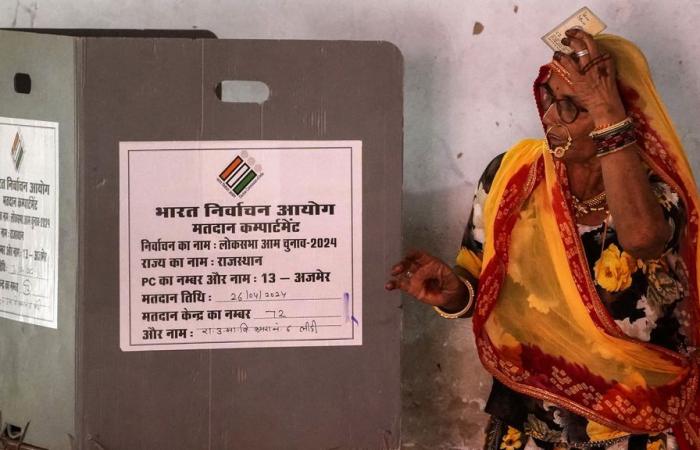NOS News•today, 6:45 PM
Due to climate change, South Asia is hit by longer and hotter heat waves early in the year. The consequences of this are now also noticeable during the Indian elections that started last week. Divided over seven voting days, Indians in various parts of the country will go to the polls until June 1. Meteorologists warn of even warmer voting rounds in the coming weeks.
Before the monsoon brings cooling in the summer months, temperatures in Central India can rise high. Indians are used to that. They adjust their work pace accordingly and, where possible, the hours they work. There are only limits to the adaptability of the human body. In parts of India, temperatures exceeded 42 degrees last week, a heat that feels even heavier due to high humidity.
That heat appears to have had an impact on the first round of elections in which the most seats can be divided. Turnout was 4 percent lower compared to the first election phase in 2019. That is almost 8 million people.
Polling booths open longer
It would be better to hold the elections in the cooler months of January and February, Roxy Mathew Koll of the Institute of Tropical Meteorology told Indian news website The Wire. “You can see that the weather does have an influence on turnout,” says Koll.
The lower turnout immediately put Prime Minister Modi on edge. During an election rally this weekend, he called on Indians to vote. “Think of our soldiers who protect our borders despite the weather conditions. Snow, heat or in the rain, they stand for our country.”
During the second round of elections held today, polling booths in Bihar and West Bengal will remain open for two hours longer than usual. The question is whether this measure will actually boost turnout.
Heat plan
According to scientists at World Weather Attribution, extreme heat waves on the South Asian subcontinent will become thirty times more likely in the future due to climate change.
Koll says the region is the ultimate example of what the rest of the world can expect in terms of climate change. “Tropical weather systems develop quickly, are fast moving and small, making them unpredictable.” According to Koll, better and more detailed plans are therefore needed throughout the region that respond to the consequences of extreme weather.
Officially, there is no national heat plan for these elections. This year there are consultations between the Meteorological Institute, the National Disaster Agency and the Election Commission to better inform citizens in advance and introduce additional measures. Journalist Aathira Perinchery noticed this when she cast her vote in the state of Kerala today. “In my voting booth there was a fan and extra water was available.”
The scale of the Indian mega-elections also makes responding to the weather with a clear plan difficult. Because while in Tamil Nadu there are special polling booths made of coconut leaves today to combat the heat, voters in Jammu and Kashmir have to take into account heavy hailstorms.
Ballot paper
More and more Indians are noticing the consequences of climate change at the polls, but the theme is hardly reflected in the election manifestos of parties on the ballot paper. For example, the manifesto of the ruling party BJP states that they want to make India “climate ready”. But they are not very specific and the BJP is one of the few parties that mentions climate at all.
“Political parties are still not held accountable for their climate plans by Indian voters,” says Koll. “While a large part of the population has to deal with the consequences. That has to change.”
For most Indians, these elections are mainly about issues that impact their wallets. Concerns about high unemployment among young people and at the same time the hope that economic growth will continue under the next government dominate these elections.
Tags: Heat Indians polls turnout noticeably
-





